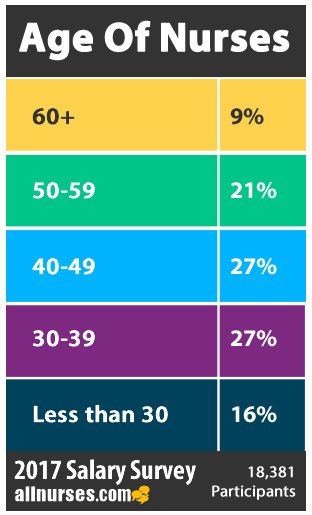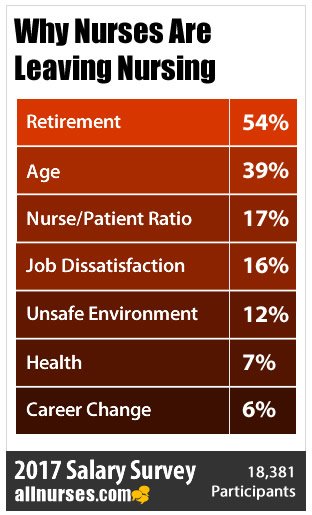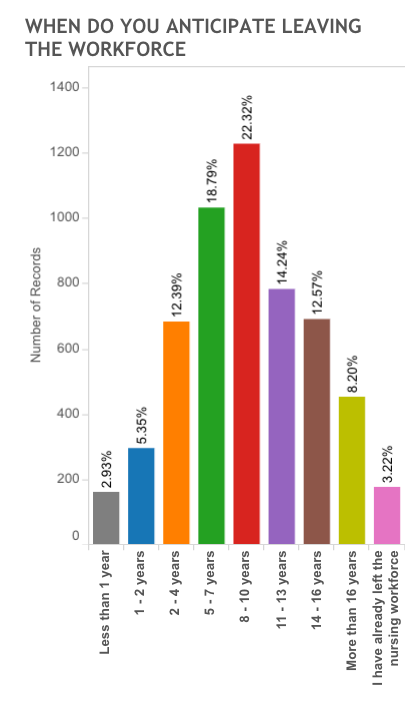In our 2017 salary survey we asked nurses when they anticipate leaving the nursing workforce and factors influencing their decisions. Using data from more than 18,000 participants, projections for the future of the healthcare industry, and statistics about nurses and patient population, we can discuss ideas about what seems to be continuously driving this shortage and perhaps how a difference can be made.
Nursing is one of the fastest growing occupations, yet with more than 3 million nurses in the U.S., demand for nurses is rapidly catching up with the supply. Let's take a look at where we stand right now in the shortage and where we can predict the next decade to take us. Using the 2017 allnurses salary survey, projections for the future of the healthcare industry, and statistics about nurses and patient population, we can discuss ideas about what seems to be continuously driving this shortage and perhaps how a difference can be made.
A Bit of History
The shortage of nurses at the bedside has been an ongoing problem for decades that has ebbed and flowed due to several factors. Looking back at the 70's you will see a large number of women entered nursing schools around the country. This is In some part due to the demand, but primarily due to the limited number of choices for women in the workforce.
Shortage Postponed
As we jump forward to the present, we can see how those same nurses of the 70's who are part of the largest generation in American history, the Baby Boomers, are getting ready for retirement. However, due to economic uncertainty and recession, many nurses of this age and generation who might consider retiring, have deferred doing so. As the economy begins to stabilize and is projected to continue to upswing, a very large portion of our nursing population will be leaving the full-time workforce. According to the ANA, nearly 700,000 nurses are projected to retire or leave the labor force by 2024.
In a 2013 study conducted by the U.S. Health Resources and Services Administration, 187,200 nurses reported that they intend to retire or take a non-nursing job when the economy improved. Almost 82,000 intend to change to Part-time employment, which would add up to about 270,000 Registered nurses leaving full-time employment. With these retirement statistics added to other factors we will discuss, the nation will need to produce 1.13 million NEW Registered nurses by the year 2022 to fill these jobs.
FIGURE 1 Ages of Nurses - 30% Age 50 and Above (Boomers)

The Aging Boomers
The aging Baby Boomers will present other challenges that will impact the nursing shortage and the healthcare industry in general. America has had a vast increase in the number of people over 65 with chronic medical and health issues that put a strain on the health system. As baby boomers continue to age, it is projected by the Centers for Medicare and Medicaid Services, that between 2010 and 2030 the population of senior citizens will increase by 75% to 69 million. That will make 1 in every 5 Americans a senior citizen. Approximately 80% of senior citizens have 1 chronic condition and 69% of seniors have at least 2 chronic medical conditions. As people live longer with multiple chronic diseases, demand for services will increase including hospitalizations, driving the demand for bedside nurses even higher.
In addition to the aging Baby Boomers, the combination of the inundation of new patients with access to the healthcare system due to federal insurance reform (yet to be seen), plus a stronger economy will result in a flooding of the healthcare system. Shortages are expected to occur across the entire healthcare field, but nurses will take the biggest hit.
According to the US Department of Labor Statistics (BLS), employment projections for nurses between 2012 and 2022, total employment rates for Registered Nurses and Advanced Practice Nurses will need to increase by 575,000 to meet the demands of all of the factors influencing healthcare today. You would think that this means an increase in the number of students entering into nursing programs, however, that is not the case. The BLS mentions that "US nursing schools turned away almost 80,000 qualified applicants from BSN and graduate nursing programs in 2012 due to insufficient faculty, clinical sites, class space, clinical preceptors and budget constraints."
While there have been some strides in several states and national programs in offering incentives for students to attend nursing school, aging faculty leaving the workforce again becomes a barrier. Some universities are providing fellowships and loan forgiveness for nurses who agree to teach after graduation in the university's state. Also, some companies associated with healthcare have jumped on the bandwagon of support for nurses during this shortage.
Where is the Nursing Shortage Today?
The top 5 states that are feeling the nursing shortage the most in 2017 are:
- California
- Florida
- New York
- Ohio
- North Carolina
There are several others close behind due to either aging population in that state, decrease in nursing school graduates, or nurses leaving the bedside due to various reasons. Nurses also want to practice to the fullest scope of practice and some states limit what nurses can do legally. South Dakota, for example, limits the scope of how Advanced Practice Nurses can practice clinically. Therefore those states may have lower desirability for nurses looking to practice healthcare to the fullest extent of their license.
Why & When are Nurses Leaving?
FIGURE 2 Factors Affecting Leaving Nursing

FIGURE 3 When nurses age 50 and above will leave

The 2017 allnurses Salary Survey results show the bulk of nurses from all levels of education, experience, specialty, locations, etc. plan to leave the nursing profession due to retirement and age as we would expect. While the statistics for all respondents show almost 54% leaving in more than 16 years, Figure 3 above shows statistics for those 50 years of age and above. 61.78% of nurses in that age group will leave the workforce within 10 years, 39.46 leaving before 7 years. That will account for more than one million nurses across the U.S. This will definitely impact the timing and severity of the nursing shortage.
Job dissatisfaction is the next primary reason nurses report leaving. All of the reasons come back to the nursing shortage in some way. Nurses are leaving due to nurse/ patient ratios being unsafe. This may be one of the most discussed topics in nursing today. Groups have been formed to put pressure on the legislature to improve these ratios. Many feel (and studies support) that caring for too many patients leads to increase in medical errors, low patient satisfaction, decreased quality of care. Having poor staffing numbers also increases the amount of overtime that nurses are required to work; which increases fatigue and high burnout rates. Nurses do not feel safe in caring for their patients when they are stretched so thin. As nursing is a profession that incorporates technology, critical thinking, and emotional connection with patients and families, you can see where these factors would lead to job dissatisfaction. Nurses feel unable to give what patients deserve and this can take an emotional toll on individuals and alter the tone of the work environment. Increased patient loads equal high turnover which is costly, disruptive and potentially harmful to patient safety.
Overall the nursing shortage is a circular problem. Nurses are leaving the bedside faster than they can be replaced. The patient population will continue to increase which will make the nursing shortage that much more dramatic. As nurses are dissatisfied and feel unsafe and under supported, they are either choosing to leave healthcare altogether, advance their degree, or continue nursing but in a non-bedside capacity. Although nurses from all areas, levels and specialties will be exiting in great numbers, the bedside exodus will be felt the greatest. This shortage is projected to worsen as baby boomers retire from nursing and create a larger patient volume to be absorbed into the healthcare system. Several states are already feeling the effects of the "nursing shortage tsunami" as it has been called and the trend will continue unless we can make changes.
What Do You Think?
Take a look at the interactive graphs below to see why and when nurses are leaving the workforce. Do you see anything surprising? How does your thinking about the why and when of leaving the nursing workforce compare with the results?
Let us know your thoughts. Are you feeling the shortage in your area already? What other factors go into the shortage? How do we make a positive impact?
Nurses Leaving the Workforce
FIGURE 4 When Do You Anticipate Leaving the Workforce
FIGURE 5 When Do You Anticipate Leaving the Workforce
Why Do You Plan to Leave the Nursing Workforce?
FIGURE 6
Be sure to view the 2017 allnurses Salary Survey Results Part 1
References:
BHW.HRSA - The Future of the Nursing Workforce: National and State Level Projections, 2012-2025
NursingWorld.org Nursing Shortage
Bureau of Labor Statistics Employment Projections: 2014-24 Summary
TheAtlantic.com/The U.S. Is Running Out of Nurses/Feb 3, 2016



gsands
6 Posts
Yes..........it is not difficult to see where profits are more important than patient care. IF it was a question of providing care to people, there would be pressure to decrease the expense of education. Instead the focus is on making sure the person who gives you a bed bath has a BSN behind her RN. Case in point, the local education facility in my town just announced their answer to the shortage. They are offering a 12 month program for $45K to anyone with a previous 4 year degree..any field, no experience in nursing required. In turn the person gets a BSN.
Nice.